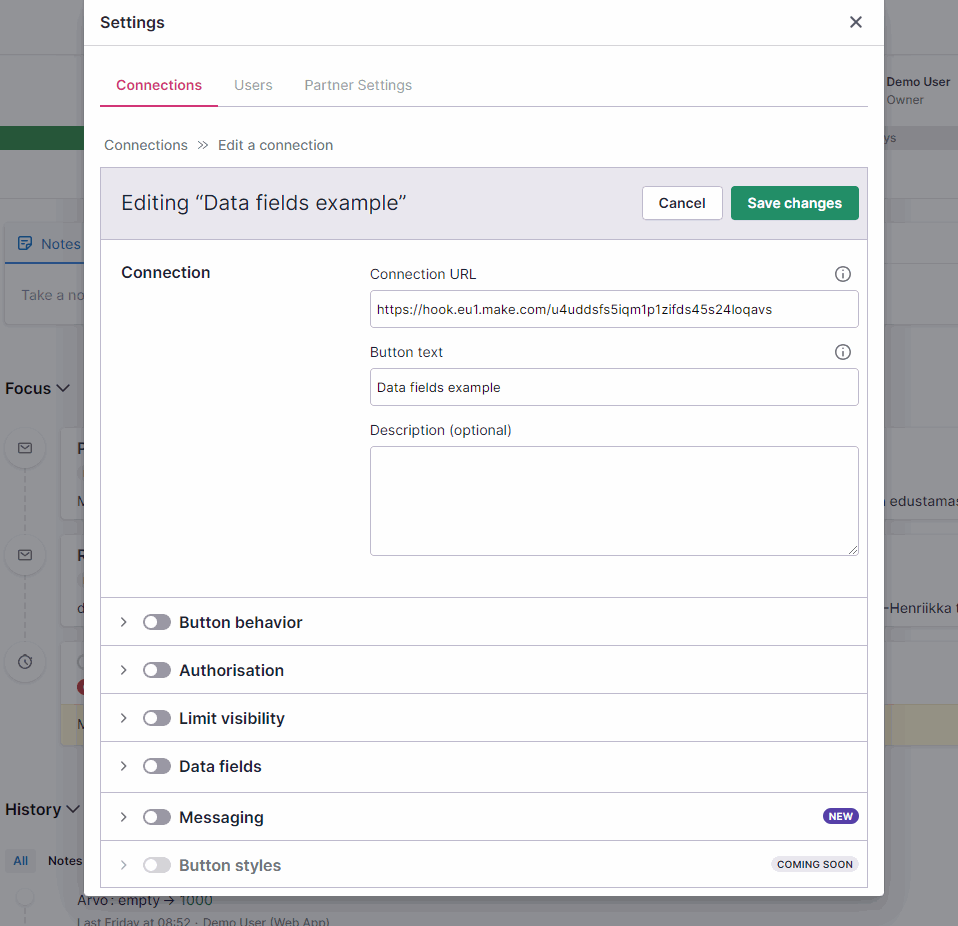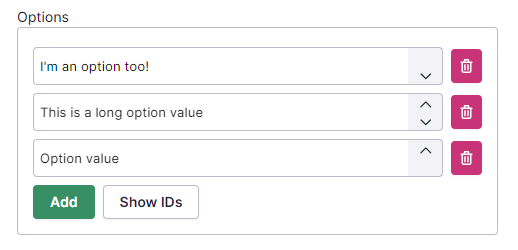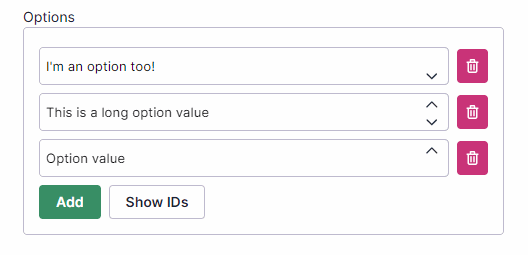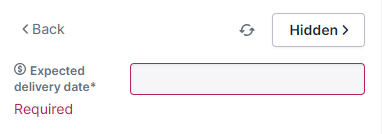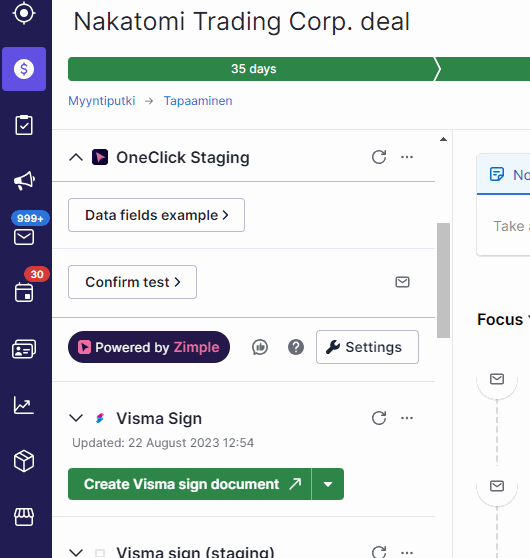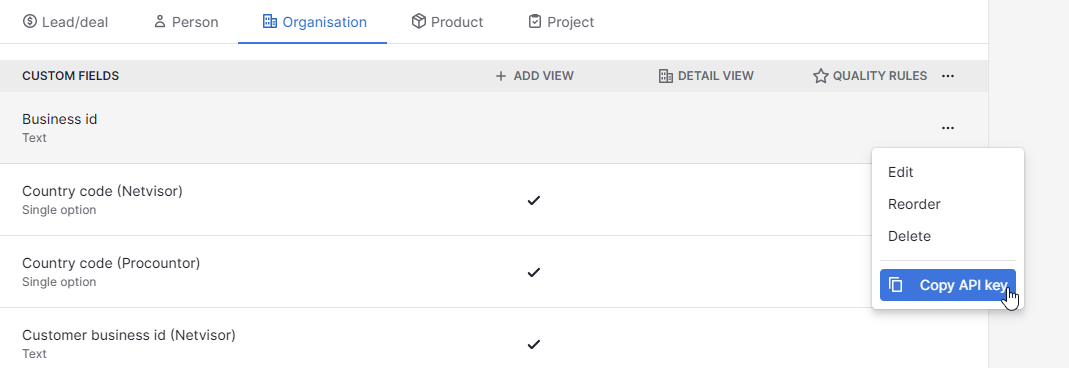Data fields
Don't forget to check out our Make and Zapier Data fields examples once you've read this article!
The Data fields features allows you to add Pipedrive's fields to your OneClick trigger data. On top of that it presents users the data fields that they are sending, and you can also make the fields required. When needed you can utilize so called "disposable" fields, that are OneClick specific one-time fields. You can also organize your connectionbutton or give users instructions with additional UI elements.
Add fields
First enable the Data fields feature and add your fields. You need to select the field type and then browse or search for a field by name. You can mark the fields as required, and sort by drag and drop:
Pipedrive fields
You can add deal, organization or person fields to your connection.button. The field selection includes Pipedrive standard and custom fields. The field selection also contains some fields that are not user editable (e.g. Total activities, Update time etc.).
Disposable fields
Disposable fields are editable fields within OneClick, and can be filled in by the user before triggering the connection.button. Disposable field values will be one-time, so on the next trigger the value will be empty again.
Field type
Disposable fields can be type of boolean, date, email, number, short text, long text, multi select and single select.
Please note, that if you add a boolean disposable field and mark it as required, in practise this means that the user needs to set the boolean field to true before the connectionbutton can be triggered.
Field label
The field name, visible to end user
Field key
The field key name which will be used in the Connectionbutton data payload (please read more below). Field keys will be generated automatically based on the label, but can be changed. Please note that keys need to be unique.
Options
If your disposable field is type of single or multi select, you need to add the predefined selectable options. Add new options with the Add button, and delete existing ones with the trash bin icon. You can sort the options with the arrows on the right hand side of each option:
When you have added your options and saved your button, you can come back and click on the Show IDs to see the option's ID values. ID's are convenient if you ever need to change your option label. For example if your automation would just use the option value to see which options are selected, changing the option label would break your automation. When using ID's instead the label would not matter:
Additional elements
Additional elements allows you to customize the UI of your data field connectionbutton
Please note that an Additional element cannot be the only field type in a connectionbutton
Header
Select the header font size in the Size dropdown menu and add the header text in the Text field.
Label
Add the label text in the Text field.
Divider
Select the divider color with the Color picker, you can always revert back to the default color with the Set default button.
Hidden fields
You can mark a data field hidden if you want to get the field value in your connectionbutton payload, but don't want to present the field and value to the user.
Field visibility
Data fields are aware of the Pipedrive context, so if your connectionbutton has for example deal fields enabled but you trigger the connectionbutton from a Pipedrive organization the deal fields will not be presented. Only a connectionbutton triggered from a deal can present all 4 field types (deal, organization, person and disposable). A connectionbutton triggered from an organization or a person can only present fields of it's own type and disposable. It is recommended to use the data fields feature together with the Limit visibility feature to avoid unexpected results.
Include deal products
You can include Deal Products in your connectionbutton payload, which helps you by not having to fetch the Deal Products separately in your automation / end-point, and you can also make sure products are selected for the deal where required.
If you wish to include Deal Products in your connectionbutton payload you can enable this feature:
The Deal Product data will also automatically include Product data with it, so you don't need to fetch the
You can require the deal to have at least 1 deal product added to your deal. In this case if the deal does not have any fields attached (or you try to trigger the connectionbutton from an organization or a person object) you will get an error message and the trigger is prevented.
Please note: If you trigger a connectionbutton which has Deal products required from an organization or a person you will see an error message, as Deal products are not available. It is recommended to use the Include deal products -feature together with the Limit visibility feature to avoid unexpected behavior.
Using a connectionbutton with data fields
When you click on a connectionbutton with data fields, the fields an values will be presented. If the connectionbutton contains disposable fields you can (or have to) fill them in. When ready click on the button again in the top right corner. If a required field is missing you cannot continue before the field value(s) have been set. If you need to fill in field values go to the deal, person or organization (depending on the field type) and fill in the value, then click on the refresh icon next to the connection button.
Data sent with connectionbutton click
When you trigger a connectionbutton which has data fields enabled, the fields will be added to the JSON payload:
{
"identifier": "741eaac7-b717-4c66-9f70-2e8sddb7ced",
"resource": "deal",
"view": "details",
"userId": "12104077",
"companyId": "7354412",
"selectedIds": "21224",
"fields": {
"deal": {
"0fc4b8500dc9b79403e607a1fc8bd350a2fe6261": {
"field_label_value": "2023-08-24",
"field_name": "Due date",
"field_type": "date",
"field_value": "2023-08-24",
"is_required": true,
"is_hidden": false
}
},
"organization": {
"a46ff54d3aead6f5db210fe6d6f80160cf09a8b1": {
"field_label_value": "123456-7",
"field_name": "Business id",
"field_type": "varchar",
"field_value": "123456-7",
"is_required": true,
"is_hidden": false
}
},
"disposable": {
"select": {
"field_label_value": "Option 2",
"field_name": "Select",
"field_type": "singleSelect",
"field_value": {
"name": "Option 2",
"key": 28
},
"is_required": false,
"is_hidden": false
},
"message": {
"field_label_value": "Hello!",
"field_name": "Message",
"field_type": "varchar",
"field_value": "Hello!",
"is_required": false,
"is_hidden": false
}
}
}
"products": {...}
}In the payload, under fields, you will find a collection for each of the field types. In each of these collections you will find an array of fields, identified by the field key.
Please note that the disposable field property field_value will be an array in case of a single or multi select field, containing the selected option name and it's corresponding unique id
Deal product data
If you selected Deal Products in you payload you will find them under the products array. The Product data is then found under the product array under each Deal Product:
"products": {
"0": {
"id": 12671,
"deal_id": 21597,
"product_id": 3997,
"product_variation_id": null,
"name": "Awesome Metal Pants",
"order_nr": 0,
"item_price": 604,
"quantity": 2,
"discount_percentage": 5,
"duration": 1,
"duration_unit": null,
"sum": 1147.6,
"currency": "EUR",
"active_flag": true,
"enabled_flag": true,
"add_time": "2023-09-08 11:44:39",
"last_edit": "2023-09-08 11:44:39",
"comments": null,
"tax": 24,
"quantity_formatted": "2",
"sum_formatted": "€1,147.60",
"tax_method": "inclusive",
"discount": 5,
"discount_type": "percentage",
"product": {
"id": 3997,
"name": "Awesome Metal Pants",
"code": "43",
"description": null,
"unit": "CM",
"tax": 24,
"category": null,
"active_flag": true,
"selectable": true,
"first_char": "a",
"visible_to": "7",
"owner_id": {
"id": 11109077,
"name": "Demo User",
"email": "demo.professional@zimple.fi",
"has_pic": 1,
"pic_hash": "9976f9ecc969efcc02d8783cefd7cc23",
"active_flag": true,
"value": 11109077
},
"files_count": null,
"add_time": "2023-03-28 09:31:07",
"update_time": "2023-03-28 09:31:08",
"prices": [
{
"id": 4028,
"product_id": 3997,
"price": 604,
"currency": "EUR",
"cost": 0,
"overhead_cost": 0
}
],
"product_variations": [],
"5b34bc4d67d7032544761274f1c7270522a6b4f4": null,
"239b2be6ac3d905f5559f8879ec3b527966d4ea0": null,
"b2b00f5ee2a8b5c4f64c035ef7cdea6155974413": null,
"4bc73109c7eaaf1338c1152473bd078f69786442": null
}
}
}Field keys
Pipedrive default field keys are dictated by Pipedrive. You can obtain field keys from the Pipedrive settings (Company settings -> Data fields). Click on the three dots next to your field name and select Copy API key (read more about Pipedrive data fields here).
Pipedrive custom field keys are hard to remember and recognize, but you can always see the field name in the field_name property (read more below)
Disposable field keys are automatically generated but they can be changed if necessary.
Field label value
The field_label_value property contains the visible value of the field, as seen in Pipedrive
Field name
The field_name property contains the field's name in Pipedrive
Field type
The field_type property contains the Pipedrive or disposable field type
Field value
The field_value property contains the field value. This may be the same as field_label_value, but in some cases (for example single select field) it is the option id
Is required
The is_required property contains the information if it is marked as required in OneClick.

